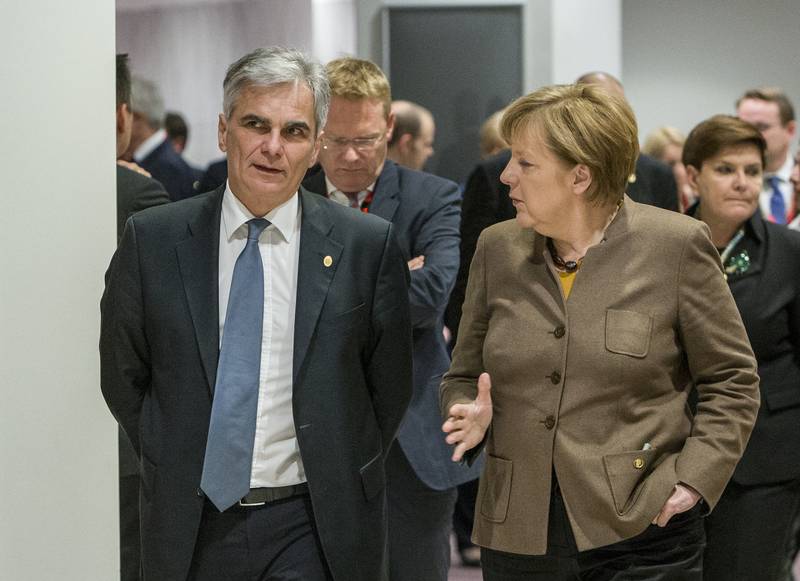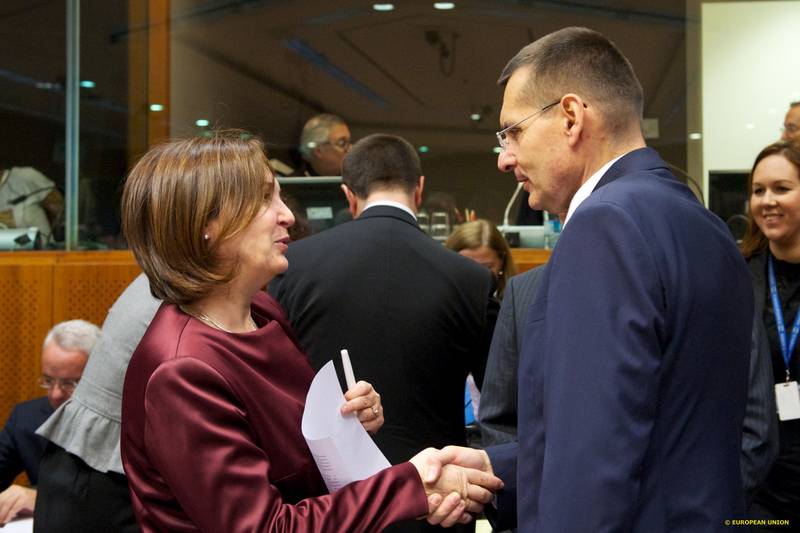The Effects of the Arab Spring Unleash a Crisis of Mistrust in the EU
Elitsa Zlateva, Bogomil Gospodinov - trainee, July 27, 2012
 On June 14, 1985 on the board of the ship "Princess Marie-Astrid", in the vicinity of the unknown Luxembourg village of Schengen, located near the border between Germany and France, 5 of the then 10 Member States of the European Community put their signatures under one of the most significant and ambitious pan-European projects. The newly signed Schengen Agreement is now one of the most vivid symbols of modern Europe, symbolising solidarity and trust between nations.
On June 14, 1985 on the board of the ship "Princess Marie-Astrid", in the vicinity of the unknown Luxembourg village of Schengen, located near the border between Germany and France, 5 of the then 10 Member States of the European Community put their signatures under one of the most significant and ambitious pan-European projects. The newly signed Schengen Agreement is now one of the most vivid symbols of modern Europe, symbolising solidarity and trust between nations.
Since 1995, the Schengen system operated in 25 European countries almost flawlessly. During this period, the significant challenges it faced were neither too many nor too serious. However, when in the early 2011, as a result of a series of revolts in the Arab countries, thousands of refugees headed to the Old Continent searching for asylum, the reactions of some Member States and European institutions gave rise to questions whether solidarity and confidence in relation to the free movement of persons within the EU have not been already exhausted.
A recently published study of the French think tank "Notre Europe" analyses the functioning of the Schengen area after the Arab spring and concludes that the ongoing revision of the Schengen mechanisms is a result of a crunch in the fragile balance of trust and distrust in the EU with regard to free movement of persons within the Union. Moreover, the study warns of a "radioactive effect" that may cause the mutual confidence between the Member States and the EU institutions, and among the institutions themselves to spread to other key policies.
The speed with which the review of the Schengen procedures has developed from the spring of 2011 until now rather shows that the crisis of mutual trust in Europe just needed an occasion to unleash. Today the Parliament and the Council are practically at war because of the Schengen governance and the outcome of the conflict as well as the scale of its consequences can hardly be predicted. The talks between the major players on the Schengen drama are currently
deadlocked.
The rapid agreement of the Commission from April 2011 to begin a revision of the rules for reintroduction of the border controls within Schengen, according to Notre Europe, "has paved the way for the weakening of mutual trust and solidarity in parallel". The Commission must now not only mediate in the war between the Parliament and the Council but also has to fight for its own voice in the Schengen decision-making. Simultaneously, the EC should also seek to restore the shaken spirit of solidarity and trust in the EU.
The Council, on the other hand, is engaged in bitter fighting on two fronts: one is to restore cooperation with Parliament and the second is to cope with the mutual distrust and nervousness among member states in relation to who, how and how much responsibility should take regarding to the preservation of order in the Schengen area. This nervousness was reflected in the British and French proposal for sanctions against countries (particularly Greece), which do not cope with their obligations to secure the EU external borders. A Franco-German letter of April 2012 did give a signal that "punitive approach" could get wider support among the Member States. As a result, currently the Council is not exactly a place in the EU where trust and understanding prevail.
distrust and nervousness among member states in relation to who, how and how much responsibility should take regarding to the preservation of order in the Schengen area. This nervousness was reflected in the British and French proposal for sanctions against countries (particularly Greece), which do not cope with their obligations to secure the EU external borders. A Franco-German letter of April 2012 did give a signal that "punitive approach" could get wider support among the Member States. As a result, currently the Council is not exactly a place in the EU where trust and understanding prevail.
According to Notre Europe, the atmosphere there may change for the better in the near future thanks to the new French president, François Hollande. While in recent months France was trying by all possible means to find reasons to reinstate border checks, the new president of the republic will most likely join the group of countries seeking to maintain the principle of free movement as it stands. France is very likely to completely reverse its current course and become something of a peacemaker. The Parliament, in turn, is preparing for
prolonged trench warfare.
On the 14 June, the Parliament unilaterally terminated its cooperation with the Council on five different dossiers until misunderstandings concerning the governance of Schengen are removed: amendment of the Schengen Borders Code, combating attacks against information systems, the European Investigation Order, budget 2013 relating to internal security and EU passenger name records.
With regard to the approach for revision of the Schengen procedures and philosophy, it seems that there are several problematic issues which once again, according to Notre Europe, “are not neutral when examined from the viewpoint of mutual trust and solidarity”. The first concern the significant difficulties which some Member States encounter in their obligation to secure EU’s external borders: at least from a decade, it is obvious that in countries like Greece, Italy and Malta the influx of illegal immigrants prevents them from coping with temporary lodging and processing of asylum applications.
The second issue is to determine whether deficiencies at internal borders are enough a reason for the effective return of border controls and to what extent it should be related to a possible public threat. According to the Treaty on European Union (TEU), freedom of movement is inviolable, except in cases where public security is concerned. In other words, the separation of the reintroduction of border controls from public policies can result in numerous legal problems. While the documents presented by the Member States do not always discuss the issue of public threats, the Commission and the Council consider this one of the key prerequisites for any restoration of border controls. The accumulated mutual distrust already showed
undesirable side effects
 to other related policies such as asylum procedures in the EU and the mutual representation of Member States in issuing visas. Over the years the asylum system, also known as the "Dublin Regulation", was not sufficiently effective, mostly because of the serious flaws and shortcomings of some national systems that fail to cope with the excessive flow of immigrants. A good example is the inability of Greece to work with European standards and requirements in terms of refugee flows.
to other related policies such as asylum procedures in the EU and the mutual representation of Member States in issuing visas. Over the years the asylum system, also known as the "Dublin Regulation", was not sufficiently effective, mostly because of the serious flaws and shortcomings of some national systems that fail to cope with the excessive flow of immigrants. A good example is the inability of Greece to work with European standards and requirements in terms of refugee flows.
For this reasons namely the European Commission proposed a mechanism allowing the suspension of transfer of asylum seekers towards the Member States that experience such kind of problems. Instead of a suspension mechanism the Member States however proposed the introduction of an early warning system, so that when a problem in the functioning of the asylum system of a State jeopardises the application of the Dublin Regulation, corrective mechanisms must be put in place. In a similar way, the Member States refuse to see themselves bound to relocation mechanisms that aim to redistribute beneficiaries of international protection from a Member State that experiences problems in the field to another Member State. “Solidarity among Member States does not seem to be a priority in asylum policy”, comments Notre Europe.
In the midst of such complex relations, the decision concerning Bulgaria’s and  Romania’s accession to Schengen, due in September, can be interpreted as
Romania’s accession to Schengen, due in September, can be interpreted as
a signal whether the EU balance will tip towards trust
or mistrust. Despite that it has been almost a year since the European Commission and the Parliament recognised the technical preparedness of the two countries to join the Schengen area, Bulgaria and Romania have not yet received the political “vote of confidence”. One of the most probable reasons for this might be the unfortunate experience with Greece, suggests Notre Europe. “A quick glance at the Schengen map, however, provides us with an explanation. When Bulgaria enters the area of free movement, there will be territorial continuity in the Schengen area with Greece. Now, the difficulties encountered by this Member State in managing migration flows, especially at its border with Turkey, is a source of concern for several Member States. Thus, the possibility of Romania and Bulgaria’s accession to the Schengen area is in fact delayed because of the mistrust of certain States regarding Greece.”
 Werner Faymann, Angela Merkel | © Council of the EU
Werner Faymann, Angela Merkel | © Council of the EU Rumyana Bachvarova, Petre Toba | © Council of the EU
Rumyana Bachvarova, Petre Toba | © Council of the EU Meglena Kuneva | © Council of the EU
Meglena Kuneva | © Council of the EU